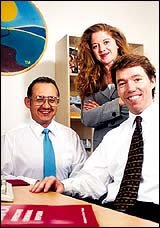


| ||
 |
Over a six-month period, 67 misdemeanor offenders were referred to a pilot project conducted in Los Angeles. Nearly two years after its completion, only one had returned to the court – an unheard of recidivism rate of 1.5 percent. The continuing success of the Criminon program has caused probation officers, judges and others to study it with sharp interest. |
Grassroots Program
Rehabilitates
Offenders, Yields
Remarkable Results
by George Michelsen

ith a population of more than 1.7 million, the fourth largest community in the United States is also the costliest to the average taxpayer.
In raw numbers, it follows only New York (7.3 million people), Los Angeles (3.5 million) and Chicago (2.8 million), overshadowing Houston and Philadelphia (roughly 1.6 million apiece), and far surpassing San Diego (1.1 million) and all others.
Experts predict the population in this community — America's jails and prisons — escalating to 3.5 million by 2004.
 Unfortunately, most who enter this area of the criminal justice system are never reformed or corrected. 80 percent return to prison or jail within one year of serving time. Indeed, many authorities maintain that these institutions worsen inmates as they emerge embittered, bent on revenge and better "educated" to a life of crime.
Unfortunately, most who enter this area of the criminal justice system are never reformed or corrected. 80 percent return to prison or jail within one year of serving time. Indeed, many authorities maintain that these institutions worsen inmates as they emerge embittered, bent on revenge and better "educated" to a life of crime.
The scope of the problem explains the widespread interest sparked by positive results from a pilot project conducted in a municipal court in Los Angeles.
Over a six-month period, 67 misdemeanor offenders were referred to the pilot, now known as Criminon's Community Education Center. As of July 1998 — 22 months after its completion — only one had returned to the court — an unheard of recidivism rate of 1.5 percent.
"It Changed My Life"
The pilot project was part of the international Criminon ("no crime") rehabilitation program, which makes it possible for those convicted of offenses to reform and continue their lives, without further crime.
While the pilot demonstrated that people can change, Jenny, a single mother with two children, serves as a more recent case in point for long-term success of the Criminon program. After years of personal trouble, the low point in her life came when a warrant was issued for methamphetamine possession. She concluded she couldn't live with that hanging over her head and turned herself in.
Standing before the judge, Jenny knew that her life was not something of which to be proud.
She had accomplished none of her goals and, most importantly for her, had not provided a safe family environment for her children.
Following her guilty plea, she was offered the choice of jail or participation in a program based on common-sense moral values that would help her to examine the life and behavior that had brought her before a court of law on a criminal charge. She chose the latter.
"Looking back at what happened to me over the last four years," she said, "I was always getting in trouble." The Criminon program was instrumental in changing that and turning her life around. Among other things, it made her realize that life itself was far too important to waste.
Because the program emphasized how her actions affected others, one of the most important results from the program for her was the decision to set a good example for her children.
"Before, I didn't think about anything but my little area," Jenny said. After graduating from the program, she said, "I better understood how to live my life."
As she had never completed high school, she was proud to finish the program. "It changed my life," she said. And in a life where many things seemed to be going the wrong way, she noted, "This program is the good thing that happened to me." Today she is off drugs, living with her parents, taking care of her children and working part-time.
"I Have More Respect for Others"
The centerpiece of the program Jenny completed is a course based on the booklet, The Way to Happiness, a non-religious, common-sense moral code. The booklet's 21 precepts — such as "Set a Good Example," "Don't Do Anything Illegal," "Safeguard and Improve Your Environment," "Be Worthy of Trust" and "Fulfill Your Obligations" — set forth clear, practical principles which, when applied, help to improve the level of morals throughout society.
Each precept in the booklet is studied so that the individual not only understands how it applies to his own life, but so that he can utilize the precept to increase the survival potential of those around him.
Those referred to the program are able to study The Way to Happiness at home but are also required to spend a minimum of two hours each week in a courseroom setting. After reading each section of the booklet, they answer in writing a series of questions about what they have just read and how the information can be applied to their lives. Instructors then go over each of the student's answers to make sure he or she fully understood all information from the section studied.
"I really needed this course," said David, a graduate, "because I wasn't thinking about this stuff. Now I'm doing a lot of things I should be doing. By taking this course, my life has changed for the best. I have more respect for others and also for myself. Since I enrolled in this course I have been taking all of my responsibilities like I should have from the start. And thanks to this course I am living a happier life."
Genuine Rehabilitation
Vanderbilt University Economics Professor Mark Cohen has estimated that the nation spends $90 billion each year on prisons, police and courts in the fight to curb crime. But the return on the investment is abysmal, as so many offenders return to crime after their release.
The "revolving door" through which criminals reenter the justice system has long been the bane of judges and those in law enforcement. And it belies the corrections system itself since, theoretically, once a criminal has been arrested, tried and sentenced, society should not have to worry about that person any longer. After all, the system is supposed to correct those who enter it.
|
The Criminon program fills a unique need within the system. "I've had very limited resources to deal with the problems facing our society, particularly those occasioned by rising crime," one judge affiliated with the program said, noting that the traditional means for meting out justice have been restricted to fines and jail sentences, which have not proven effective in turning people away from a path of crime.
"I now have the ability to effect significant changes in our defendant population," he said, "enabling them to lead productive, crime-free lives as a result of their participation in Criminon."
As of July 1998, more than 300 have graduated from the Criminon Community Education Centers. Due to the continuing success of the program, probation officers, judges and others involved in the justice system are studying it with sharp interest.
Judge Pamela Taylor Johnson of the Juvenile Court in Baton Rouge, Louisiana, is one of those who toured the Los Angeles Criminon Community Education Center, interviewing offenders on the program and discussing their progress with center staff and the court.
Impressed by the program's methods and purpose, which focus on restoring the individual's sense of accountability and responsibility, Judge Johnson noted that the atmosphere and the emphasis on results were conducive to bringing about change. In conjunction with Criminon, she established a Criminon referral program in November 1997 in Baton Rouge to which youth are today being referred.
A Community Education Center opened in Compton, California, in March 1998, while additional centers have been named for Washington, D.C., Tampa, Florida, and other communities that include, in California alone, Hollywood, San Jose and San Francisco.
Turning Lives Around

| ||
| Criminon Community Education Centers operate in Los Angeles and Compton, California, with additional centers planned for Washington, D.C., Tampa, Florida, and other communities that included, in California alone, Hollywood, San Jose and San Francisco. Above: Criminon Community Education Center staffers Henry Rodriguez and Sean Burke with Criminon International Executive Director Tammy Terrenzi. |
Sean Burke, director of the Criminon Community Education Center in Los Angeles, said, "In their graduation speeches, one for one participants tell their fellow students, 'I didn't particularly want to do this course in the beginning, but let me tell you, if you just stick with it and really do it, your life will change.' They start getting jobs. They start new relationships with their families. One even stated that his marriage was saved."
The effectiveness of the program is evident in the words and actions of its graduates.
One of them, Consuelo, stated, "At first I didn't care if I went to jail or not because of my situation. But as I kept coming to class it made me think differently. It helped me to understand about life and how I can make my road straight and not go off the edge. It is up to me how I want my life to be."
Another, Silvester, said, "I began the course with the same attitude that the others had. We all felt that we knew right from wrong. The problem was that nobody was really implementing what they knew."
He added, "This course reopened my general attitude about others and certain situations. Now, without anyone reminding me, I am more aware of my negative attitude that I used to carry with me daily. I no longer use excuses to commit an illegal act or get myself into problems which can multiply. Due to this course I've learned to handle situations in life with a more positive attitude and self-control."
In case after case, Criminon Community Education Centers are doing what the Criminon program has done for decades: Demonstrating that there is a way to close the revolving door, to genuinely rehabilitate offenders by restoring self-respect and providing a means to become productive members of society.
For more information on the Criminon program, write to: CRIMINON, 7060 Hollywood Blvd., Suite 220, Los Angeles, CA 90028.
Criminon: Effective Rehabilitation
While Criminon, an international criminal rehabilitation program, is strongly supported by the Church of Scientology, it is independent and non-religious. Its program is open to people of all races and creeds.
Criminon has grown out of Narconon, an independent, non-profit corporation. The secular Narconon program has been operating since 1966, from its inception inside a prison in the United States; through its 39 drug education and rehabilitation facilities around the world, tens of thousands of people have benefited from it and are leading drug-free and productive lives.

